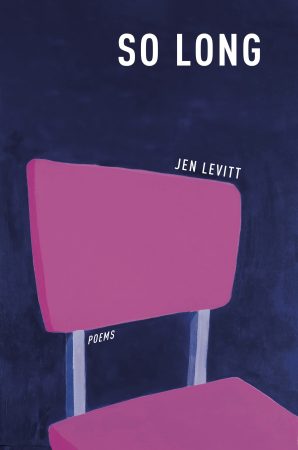
paper • 88 pages • 17.95
ISBN: 978-1-954245-50-1
eISBN: 978-1-954245-51-8
March 2023 • Poetry
Starred review from Publishers Weekly
Anticipating and then grieving the death of her father, Jen Levitt’s So Long fleshes out a full elegiac register, sitting with the mourning of farewell while holding onto gratitude, remembrance, and a permeating love. “Soon,” she says, “we’ll have to find another way to meet, as moonlight / makes the river glow.” In the contrails of bittersweet loss, Levitt’s speaker observes all that surrounds her, and the self, too, as a phenomenon in loneliness. In the suburbs, she notes high- school athletes circling “in their sweat-resistant fabrics,” “so natural in their tank tops, those dutiful kids trying to beat time”; upstate, she finds herself in temple where Broadway music has replaced prayer and discovers “no promises, / but, like hearing a rustle in deep woods & turning to locate its source, the chance for something rare.” It is this humanistic faith that inverts the title’s idiomatic goodbye into a statement of permanence, the truth of our enduring, improbable lives: look at this, she seems to command herself, “& look at how lucky I’ve been, for so long.”
Is it enough that I tried to do no harm?
I drank the milk before it spoiled,
biked to work, held doors. When I crushed
the occasional spider, I felt mostly sorry.
In the city, nature was hard to follow,
incognito in crevices along the river,
but who can tell a flower from a weed?
I met the not-knowing, & it bloomed in me
like a seed. Traffic blinked, an organism,
while I trained my mind on the mind,
which took forever. I couldn’t think my way
into the future, where love was a country
I’d never visited but wanted to. The ocean
repeated while we wandered the lemon groves.
Jen Levitt can see you, reader, in this quiet hour in the dark; this poet wrote a book that makes its own light to read by. The speaker’s inner life is seductive but not flirtatious, precise but not fussy, realized but pressingly nascent, and visionary but using all the senses for its clairvoyance. Thirty-something in New York City, making a life as a teacher and poet, losing a beloved father, learning to live with absence and longing—what a soul that peeks out from behind these translucent scenes of good-bye and remembering, to keep love from slipping away the way time does. Oh the loss is endless, as is Jen Levitt’s brilliance, her empathic light which transforms that loss into longing, into love. If you know someone who deserves everything beautiful in this world, lay this book at their feet. The lovers of realness, those who really love, will treasure this treasure.
So Long is contrapuntal: one hand plays life, the other death. Jen Levitt is circumspect, something I associate more with artists double her age. Exquisite. The death of a father rearranges Levitt’s lines. As her father recedes, our speaker emerges. Adrienne Rich wrote, “No one has imagined us,” electrified by her newfound gay life. Yet the challenges of being seen remain as old as Shakespeare. Wit, candor, and acceptance make up the poetic scales Levitt plays. Frank O’Hara is in her tune as she wanders around New York City seeking “a new kind of noticing.” Such sheets of music. What joy to read. Questions mount about her father: “I’m thinking of you now—is that enough?” So Long waves goodbye and beckons. If I go back to poems a second and third time, I’ve found a poet I cherish. That happened. Exquisiteness doubled. So long to being unseen, Jen Levitt.
With tenderness and agility, the poems in Jen Levitt’s So Long brim with subtle truths — that is until they reach moments of searing clarity. Anchored by the title poem, a meditation on a father’s illness and death, the collection accumulates a powerful humanity, revealing keen insights into the terrific undertaking of being — and becoming — a self. “I met the not-knowing & it bloomed in me.” Lucky us, to be invited into this garden of poems.